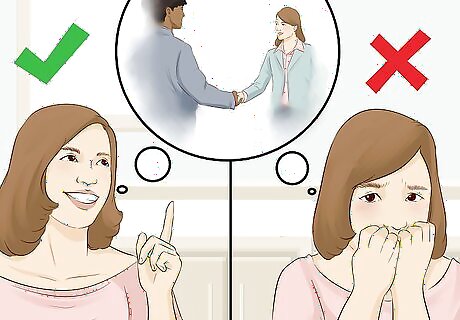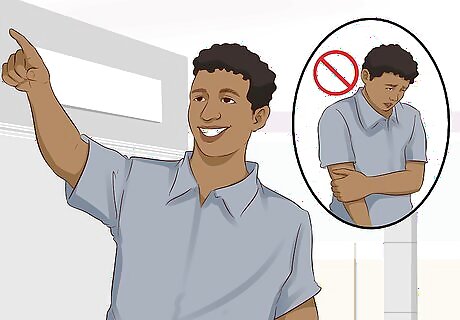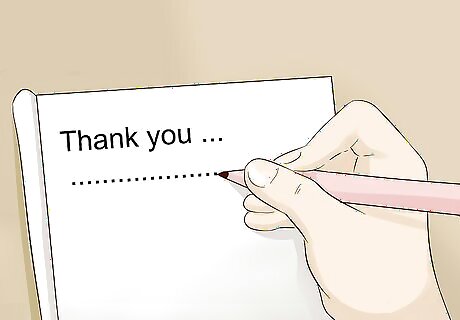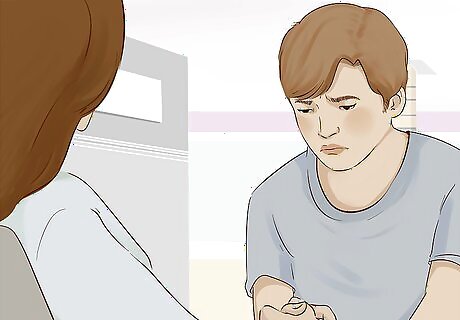
views
Looking Happy

Smile to look happy and boost your mood. One of the easiest ways to look happy is to smile, but did you know that smiling can actually make you feel better? Smiling can induce feelings of happiness just as happiness can cause a smile. Try smiling with your whole face, not just your lips. Feel your cheeks and eyes change when engaging in a large smile. This kind of “real” smile is associated with positive emotions. If you’re feeling upset or grumpy, combat those feelings by faking a smile. Soon, you may realize you’ve begun to smile naturally and it may boost your mood!

Adjust your body language to be more open. If you’re closed off, looking down, or crossing your arms or legs, people may assume you are unapproachable. Practice drawing your shoulders back, or put your hands on your hips to take up more space. People with proper posture report higher levels of happiness and self-esteem than those who slouch. By changing your body language, you can help your mind believe that you are confident. Before going into a nerve-racking situation, try doing triumphant poses like pumping your fist in the air to hype yourself up and exude confidence.

Relax and take deep breaths to reduce tension in your body. Relaxation helps calm anxiety to help you feel more at ease. If you’re feeling tense, restless, or unhappy, try some relaxation techniques like deep breathing or muscle relaxation to help you feel more balanced. This can be especially helpful before a big presentation or something that makes you feel anxious. Slow your breathing and start counting your breaths. Inhale for 4 seconds, then exhale for 4 seconds. Once this feels easy, extend to 6-second intervals and observe your breath moving in and out of your body. Soften tense muscles by doing progressive muscle relaxation, which releases tension from different parts of the body one at a time. Start with your toes, then work on muscle groups through your legs, hips, stomach, chest, arms, shoulders, and neck. Or, try something as simple as listening to your favorite song or watching your favorite TV show to calm your nerves.
Acting Happy

Focus on the positive rather than the negative. Changing your attitude and perspective can help you get through an unpleasant event. Take a moment to rethink negative thoughts and try to find some positive aspects to reflect upon. You may be stuck in a negative thought cycle and need an overhaul to help you feel more positive. Reflect on the attitude you’re bringing into a situation and whether it is in your best interest. For example, if you have to go to an event you’re not looking forward to, remember that these events don’t happen frequently. You may meet someone interesting, enjoy some good food, or be pleasantly surprised by what you learn. Acknowledge the potential positives that can come from the event and give less precedence to the potential negatives.

Fake competence and confidence. Getting through an uncomfortable situation while looking and/or feeling unfazed is a skill, and much can be attributed to confidence. For example, if you’re anxious about a presentation, tap into your innate confidence, even if public speaking makes you want to run and hide. Tell yourself you can do it. Chances are, if you exude confidence (even if it’s forced or unnatural at first), people will believe you’re happy and at ease. Speak loudly and clearly and act as if you are fully confident in your abilities. The opposite is true, too. If you go into a presentation feeling fearful, much of your body language can give away your fear, like having a shaky voice, a lack of eye contact, acting flustered, etc.

Engage in positive self-talk to encourage yourself. If you’re struggling to look or feel happy, chances are you may be experiencing negative thoughts. Positive self-talk helps you shift the focus from unhelpful thoughts to calming yourself to feel more at ease. This can help you get through an unpleasant situation more easily and help you appear happier, even if you feel miserable. Some examples of self-talk include the following: “I may not feel well, but I can still do a good job.” “This is an uncomfortable situation right now, but I know I can head home immediately afterward to deal with it.” “I am here to enjoy myself.”

Cultivate gratitude. If you’re struggling to pretend to be happy, find things to be grateful for in your life. Grateful people report higher levels of health and happiness, as well as better sleep, increased empathy, and improved self-esteem. Find things to look forward to, and be thankful for the small stuff: a roof over your head, a nice day, a good friend, or anything! You may even begin to feel happier, not just act happier. For example, think of a situation that made you feel upset or frustrated and describe it in writing. Afterward, think of 3 things that help you appreciate the difficult situation. Perhaps you were late for work because you had to get gas, but you got to buy your favorite coffee and your workplace is understanding about being late occasionally. Reflect on whether you’ll even remember the frustrating event in a week, or two, or five. Life coach Sandra Possing also recommends having a “gratitude accountability buddy” whom you text each day with something each of you is grateful for. She says, “It can be ‘I’m thankful for puppies’ or ‘I’m thankful for coffee.’ Or, it can be really profound like ‘I’m thankful for the infinite possibilities in my career.’”
Get outside and get active. Daily physical activity often boosts your mood because it releases endorphins into the bloodstream. Aerobic exercises also promote oxygen to the brain, which helps clear brain fog and unwanted thoughts. Try going for a run, working out at the gym, or even doing yoga to feel better both physically and mentally. Even if you’re not big on exercise, try going for a walk around the block just to get out of the house and clear your head. Try listening to upbeat music while you exercise, as well. If you’re already feeling sad, listening to sad music will only make you feel worse. Keep the good vibes going by listening to happy, energetic music to boost your mood. Possing also recommends listening to self-help audiobooks or podcasts. “Any time I go for a run, go for a walk, do the dishes, or fold the laundry, I pop in my earphones and listen,” she says. “I try to just incorporate it into my day so I’ve always got positivity in my ear.”
Watch some funny videos to make yourself laugh. You know what they say—laughter is the best medicine. If you’re feeling down, try watching your favorite videos on TikTok or YouTube. When you watch something funny, your brain releases endorphins that will make you feel happier. Additionally, watching cute videos releases oxytocin, which often reduces the feeling of loneliness. That being said, if you already spend a lot of time on social media, try stepping away from it for a bit. Sometimes, we feel worse about our situation when we see people posting cool things they do on social media. Just remember, people pick and choose what to post to only show their good side online. Try not to let it get you down. Possing says to “consume as much positive content as possible” to “counteract the amount of negative content that’s always coming at us from all directions.”

Allow people to support you. Strengthen your friendships and work on your social skills. Don’t isolate yourself in a time of need—reach out! Talk to people every day, and get some human contact to make you feel better. Even if it takes some force, make yourself socialize with the people you care about, and remember that they care about you, too. Acting happy can be a lot easier when surrounded by friends. If you tend to isolate, realize that this can lead or contribute to feelings of depression. Social contact is an important part of life. When you’re struggling, make sure you have people you can lean on and talk to when you get the chance.
The Psychology of Pretending to Be Happy
Pretending to be happy can sometimes make you feel better. Depending on how serious your situation is, acting happy when you’re not might actually improve your mood. Pretending to be in a good mood can help you break out of negative thought patterns and trick your brain into believing you’re happier than you are. Plus, if you look approachable, more people are likely to engage with you, which can also get you out of a funk.
Act happy if your current behavior will affect your future. Sometimes, you have to get through a situation and act natural, even if you don’t feel like it. This is especially true when the way you look and act in the moment will affect your future. For example, if you’re meeting your long-term partner’s parents for the first time and aren’t feeling well, there's no harm in putting on a smile to make a good impression. The same can be said for important interviews or presentations for work or school, as well as any events that are important to someone you care about, like a wedding.
Don’t pretend to be happy when you’re in physical or emotional pain. Not every situation will require you to look or act your best. For example, you don’t need to act happy if you’ve just broken your leg—you’re in pain! The same is true if you’re going through a difficult emotional situation, like the loss of a sibling or grandparent. It’s okay to feel sad, and no one should expect anything different in these situations.
Pretending to be happy often could be a sign of "smiling depression." Everyone feels the need to pretend to be happy now and then, but if this is something you do constantly, it may be a sign of depression. Smiling depression isn’t a clinical diagnosis, but it refers to when people with depression mask their symptoms and convince others they’re happy. Consider seeing a doctor if you experience the following symptoms: Changes in appetite: When depressed, some people tend to overeat, while others lose their appetite. Weight changes are common with any type of depression. Changes in sleep patterns: Some people struggle to get out of bed when they’re depressed because they’re constantly tired and want to sleep all the time. Others experience insomnia or stay awake all night and sleep during the day. Feelings of hopelessness: Feeling guilty, worthless, and/or hopeless are all common signs of depression, especially if those feelings are consistent. Loss of interest in activities: People with depression often lose all interest in things they normally enjoy, and those things no longer bring them a sense of happiness.

Seek help if you think you might be depressed. If you identify with any of the symptoms of smiling depression, it may be time to seek out professional help. There’s no use trying to look and act happy when you don’t feel a source of happiness within you. Seeing a therapist or counselor can help you understand if you have depression and how to handle it. People with depression often try to hide their symptoms because they’re embarrassed or don’t want to feel like a burden to their loved ones. Remember that many people suffer from depression, and it’s nothing to be embarrassed about. Your loved ones want you to be truly healthy and happy; they don’t want you to pretend for their sake.


















Comments
0 comment